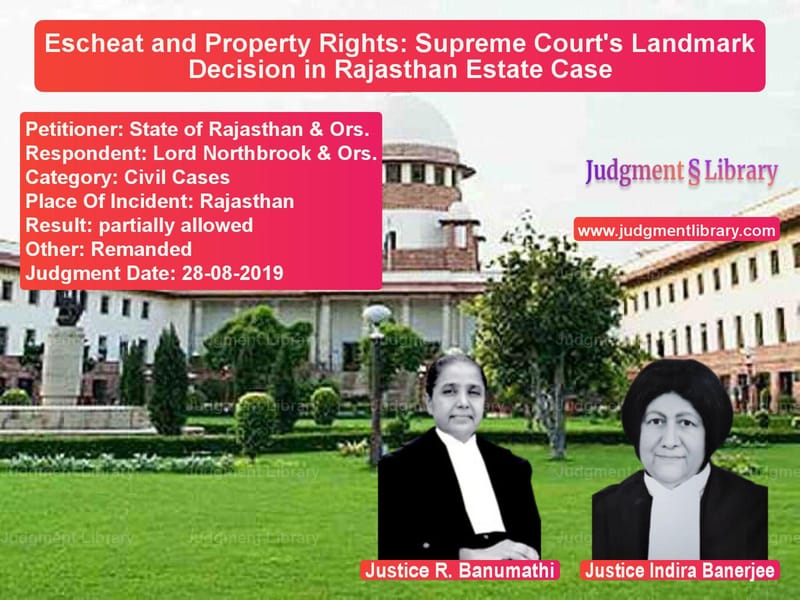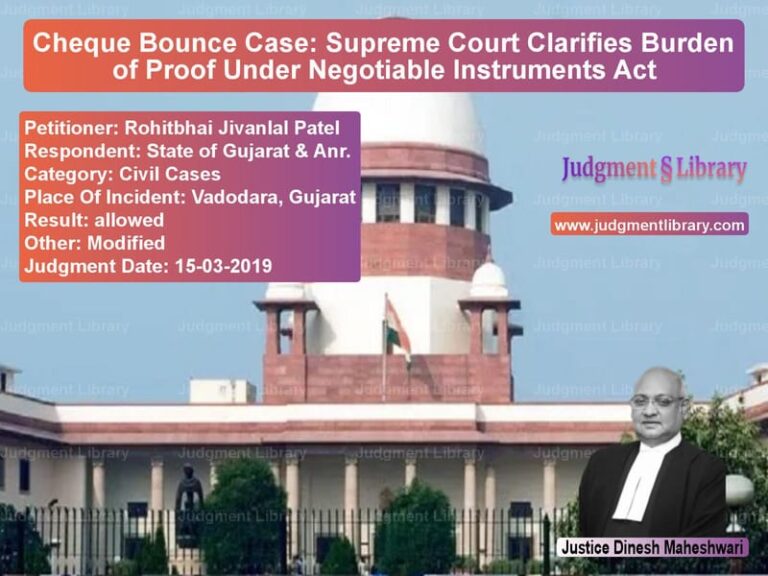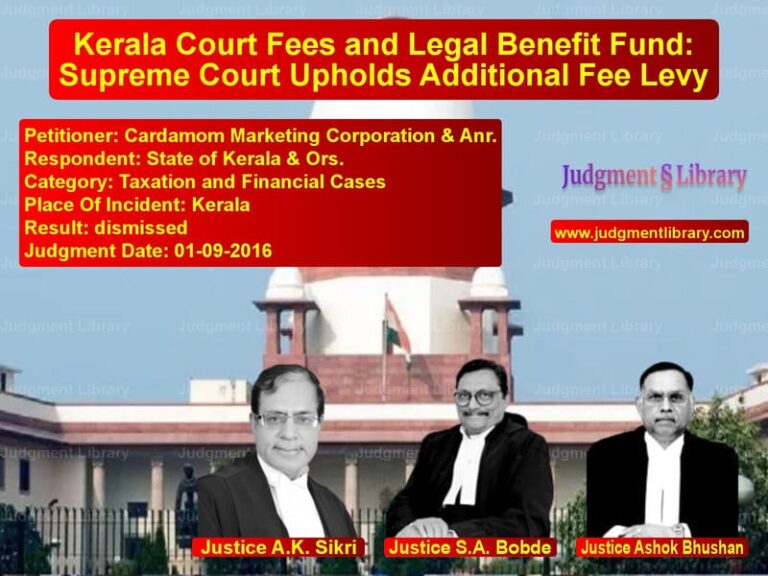Escheat and Property Rights: Supreme Court’s Landmark Decision in Rajasthan Estate Case
The case of State of Rajasthan & Ors. vs. Lord Northbrook & Ors. revolved around the ownership of properties left behind by the late Raja Sardar Singh of Khetri. The dispute primarily focused on whether the properties should escheat to the State under the Rajasthan Escheats Regulation Act, 1956 or be claimed by the Khetri Trust and alleged legal heirs. The Supreme Court’s ruling in this case clarifies the legal principles surrounding escheat, bona vacantia, and the rights of claimants.
The primary legal issue was whether the State of Rajasthan had lawfully initiated proceedings under the Escheats Act, 1956, to take over the vast properties of Raja Sardar Singh, who passed away intestate and allegedly without legal heirs.
Background of the Case
Raja Sardar Singh, a member of the Constituent Assembly and a Rajya Sabha member, passed away on January 28, 1987, in Mumbai. He was a childless widower with no immediate family members. At the time of his death, he owned multiple valuable properties, including:
- Khetri House, Delhi
- Hotel Khetri, Jaipur
- Several kothis and agricultural lands in Rajasthan
Following his death, the Rajasthan government initiated proceedings under the Escheats Act to claim these properties for the State, arguing that there were no legal heirs. The District Collector, Jhunjhunu, took possession of these properties based on orders issued in July and August 1987. However, the Khetri Trust, which claimed to be the beneficiary of Raja Sardar Singh’s will, contested this action.
Petitioners’ Arguments (State of Rajasthan)
The State of Rajasthan argued that:
- Raja Sardar Singh had died intestate, without any legal heirs.
- The properties were bona vacantia (ownerless property) and thus rightly belonged to the State.
- As per Article 296 of the Constitution, the government had the authority to claim such properties under the doctrine of escheat.
- The Rajasthan Escheats Regulation Act, 1956, was properly invoked, and all necessary legal procedures were followed.
Respondents’ Arguments (Lord Northbrook & Khetri Trust)
The respondents, including the trustees of the Khetri Trust, contended that:
- Raja Sardar Singh had executed a will on October 30, 1985, bequeathing his properties to the Khetri Trust.
- The will was legitimate, and the trust had been created before his death.
- The government could not claim the properties as escheated since the trust was in lawful possession.
- The State had taken possession of the properties illegally, violating the rights of the trustees and beneficiaries.
- There were potential heirs, including distant agnates and cognates, who could contest the State’s claim.
Supreme Court’s Observations
The Supreme Court examined the legality of the Rajasthan government’s actions under the Escheats Act and made key observations:
- The doctrine of escheat is applicable only in cases of complete failure of heirs.
- Under Article 296 of the Constitution, the government can take over properties that are truly abandoned and have no rightful owners.
- The government must prove beyond doubt that there are no legal heirs before invoking the Escheats Act.
- The Khetri Trust had filed a testamentary case in the Delhi High Court to probate Raja Sardar Singh’s will, which was pending appeal.
- The presence of agnates (distant relatives) negated the government’s claim that the properties were truly bona vacantia.
Key Ruling and Verdict
The Supreme Court delivered a split verdict:
- Justice R. Banumathi ruled in favor of the State of Rajasthan, holding that the Escheats Act was properly applied and that the properties could escheat to the State.
- Justice Indira Banerjee dissented, ruling that the State had acted beyond its jurisdiction without fully proving the absence of legal heirs.
- Due to the split verdict, the matter was referred to a larger bench for final determination.
The Court held:
“Escheat is a doctrine which recognizes the State as a paramount sovereign in whom the property would vest only upon a clear and established case of failure of heirs.”
Implications of the Judgment
This case has far-reaching implications for escheat laws and property rights:
- It reinforces that the government cannot claim properties arbitrarily under the doctrine of escheat.
- Legal heirs and beneficiaries must be given a fair opportunity to prove their claims before properties are declared ownerless.
- The judgment sets a precedent for handling cases of intestate succession and disputes involving private trusts.
The Supreme Court’s ruling ensures that the Escheats Act cannot be misused to unjustly deprive individuals or trusts of their legitimate property rights. The final decision on the matter now rests with a larger bench, which will provide further clarity on the application of escheat laws in India.
Petitioner Name: State of Rajasthan & Ors..Respondent Name: Lord Northbrook & Ors..Judgment By: Justice R. Banumathi, Justice Indira Banerjee.Place Of Incident: Rajasthan.Judgment Date: 28-08-2019.
Don’t miss out on the full details! Download the complete judgment in PDF format below and gain valuable insights instantly!
Download Judgment: State of Rajasthan & vs Lord Northbrook & Or Supreme Court of India Judgment Dated 28-08-2019.pdf
Direct Downlaod Judgment: Direct downlaod this Judgment
See all petitions in Property Disputes
See all petitions in Succession and Wills
See all petitions in Contract Disputes
See all petitions in Judgment by R. Banumathi
See all petitions in Judgment by Indira Banerjee
See all petitions in partially allowed
See all petitions in Remanded
See all petitions in supreme court of India judgments August 2019
See all petitions in 2019 judgments
See all posts in Civil Cases Category
See all allowed petitions in Civil Cases Category
See all Dismissed petitions in Civil Cases Category
See all partially allowed petitions in Civil Cases Category







